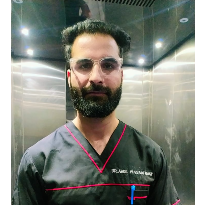Course Description
Fellowship in Nephrology is an advanced training program tailored for physicians aiming to specialize in the diagnosis, treatment, and long-term management of kidney-related disorders. Nephrology encompasses the study of kidney function, various kidney diseases, and associated treatment methods. This fellowship equips physicians with in-depth knowledge and practical skills, preparing them to become experts in the field.
Throughout the program, fellows engage in rigorous clinical and academic training to build competence in all areas of nephrology. The curriculum typically includes clinical rotations, research projects, didactic sessions, and educational conferences, ensuring a comprehensive learning experience. Fellows gain valuable hands-on experience by working alongside seasoned nephrologists in hospitals, outpatient settings, and dialysis centers.
They are actively involved in evaluating and treating patients with conditions such as chronic kidney disease (CKD), acute kidney injury (AKI), glomerular disorders, electrolyte imbalances, kidney stones, and those requiring renal transplantation. This specialized training empowers physicians to deliver high-quality nephrology care across diverse clinical scenarios.
Highlights
- 12 Months of online classes which includes 3-4 months of Clinical Observership in a leading hospital.
- Classes by experienced faculties
- Flexible learning mode
- Live doubt clearing sessions
- Educator support through LMS
- Periodic Webinars
- Associated with UGC & GRADE NAAC A++ University
- Training with Reputed Hospital
What You’ll Learn
- You'll receive a recognized fellowship certificate that validates your advanced training and qualifies you as a nephrology specialist.
- Proficiency in diagnosing and managing kidney-related conditions such as chronic kidney disease, acute kidney injury, glomerular disorders, electrolyte imbalances, dialysis, and renal transplantation.
- Practical training in diverse clinical settings, including dialysis units, ICUs, renal clinics, and transplant programs, under expert supervision.
- Opportunities to participate in clinical research, present at conferences, and contribute to academic publications in the field of nephrology.
- Opens doors to roles as a consultant nephrologist, medical educator, researcher, or clinical leader in hospitals, academic centers, and private practice.
- Fellowship-trained nephrologists are eligible for international positions, fellowships, and higher-level licensure exams in countries like the UK, UAE, Australia, and more.
Why Fellowship in Nephrology.?
Fellowship in Nephrology is highly beneficial for doctors from a career perspective for several key reasons:
Specialized Expertise
It allows physicians to develop deep, specialized knowledge in kidney care, making them experts in managing complex renal conditions such as chronic kidney disease (CKD), acute kidney injury (AKI), dialysis, and kidney transplantation.
High Demand
With the global rise in diabetes, hypertension, and aging populations, the demand for nephrologists is growing steadily. This creates strong job security and a wide range of employment opportunities in both clinical and academic settings.
Diverse Career Paths
Fellows can pursue roles in hospitals, dialysis centers, transplant programs, research institutions, and even take on teaching or consulting positions. There are also global opportunities for certified nephrologists.
Higher Earning Potential
Specialization often leads to increased earning capacity. Nephrologists typically earn more than general practitioners due to the complexity of care and expertise involved.
Leadership and Research Opportunities
Fellowship training enhances a doctor’s ability to engage in clinical research, lead quality improvement projects, and contribute to medical innovations, increasing their academic and professional credibility.
Improved Patient Impact
With advanced training, nephrologists can deliver life-saving interventions, such as dialysis and transplant coordination, significantly improving patient outcomes—offering a rewarding professional experience.
Course Highlight
Modules Comprehensive modules covering various aspects of nutrition & dietetics.
Assessments Quizzes, assignments to test your knowledge and skills.
Certification Certified Nutritionist credential upon completion.
Key Features
Advanced Training in Kidney Care
In-depth exposure to chronic kidney disease (CKD), acute kidney injury (AKI), glomerular diseases, electrolyte and acid-base disorders, and renal replacement therapies like dialysis and transplantation.
Hands-On Clinical Experience
Extensive practical training in dialysis centers, hospital wards, renal ICUs, and transplant units, under the guidance of experienced nephrologists.
Research and Academic Engagement
Opportunities to participate in clinical research, contribute to medical publications, and present findings at national and international conferences.
Multidisciplinary Collaboration
Work alongside specialists in cardiology, endocrinology, and transplant surgery to manage complex renal cases in a team-based setting.
Comprehensive Curriculum
Structured learning with clinical rotations, case discussions, didactic lectures, seminars, and journal clubs to ensure well-rounded knowledge.
Mentorship and Professional Development
Close mentorship from leading nephrologists, helping fellows build confidence, clinical judgment, and leadership skills.
Course Structure
- Basics of nephrology concepts
- Renal anatomy and histology
- Embryology of kidney
- Renal Anatomy
- Glomerular Physiology
- Tubular Physiology
- Role of kidney in blood pressure regulation
- Endocrine and Autocrine function of the kidney
- Introduction Electrolyte Levels
- Estimated Glomerular Filtration Rate
- Basics of Urinalysis
- Immunohistochemistry
- Assessment of electrolyte disorders (hyponatremia, hyperkalemia)
- Evaluation of acid-base disorders (metabolic acidosis, metabolic alkalosis)
- Urine Cytology
- Voiding cystourethrography (VCUG)
- Hypo-/hypernatremia: disorders of water balance
- Hypo-/hyperkalemia
- Hypo-/hypercalcemia
- Hypo-/hyperphosphatemia
- Hypo-/hypermagnesemia
- Clinical acid-base disorders
- Proteinuria and/or hematuria
- Lupus Nephritis
- Immunoglobulin A nephropathy and Henoch-Schönlein purpura
- Vasculitis
- Nephritic syndrome & Nephrotic syndrome
- Urinary tract infections- acute and chronic
- Cystitis and Urethritis
- Renal and perirenal Abscesses
- Fungal infections of urinary tract
- Renal tuberculosis or other mycobacterial infections
- Acute Kidney Injury (AKI)
- Types of Acute Kidney Injury
- Management of Acute Kidney Injury
- Chronic Kidney Disease
- Staging and management of CKD
- Electrolyte Disturbances and Fluid management
- Isolated defects of tubular function
- Fanconi syndrome
- Renal tubular acidosis
- Hypokalemia tubular disorders
- Urinary tract obstruction and Reflux Nephropathy
- Analgesic nephropathy
- Nonsteroidal anti‐ inflammatory drugs and the kidney
- Viral Glomerulonephritis
- Membranoproliferative Glomerulonephritis
- Interstitial nephritis
- Diabetes mellitus
- Hypertension
- Amyloid and immunotactoid glomerulopathy
- Plasma cell dyscrasias
- Sarcoidosis
- Systemic vasculitis
- Mixed cryoglobulinemia and hepatitis C infection
- Systemic lupus erythematosus
- Scleroderma-systemic sclerosis
- Rheumatoid arthritis, connective tissue disease, and sjögren’s syndrome
- Sickle cell neuropathy
- Kidney disease in pregnancy
- Management of renal Disease in pregnant women
- Drugs causing nephrotoxicity
- Management of nephrotoxicity
- Medical management of stone disease
- Nephrocalcinosis
- Autosomal dominant polycystic kidney disease
- Nephronophthisis
- Alport’s syndrome
- Nutritional screening and assessment
- Rationale for medical nutrition therapy in kidney disease
- Nutrition and fluid requirements in kidney disease
- Diets and enteral supplements in kidney disease
- Regulation of Acid-Base Balance
- Metabolic Acidosis and alkalosis
- Respiratory Acidosis and alkalosis
- Renal hemodynamics during pregnancy
- Preexisting Kidney Diseases in Pregnancy
- Kidney Diseases in Pregnancy
- Acute kidney injury (AKI) in pregnancy
- Management of renal diseases in pregnant women
- Dialysis strategies
- Vascular access Hemodialysis
- hemofiltration and hemodiafiltration
- Peritoneal dialysis
- Adequacy of dialysis
- Medical management of the dialysis patient
Eligibility
- MBBS Graduates.
- Applicants who are in their final year can also apply.
- MD/DNB/FNB & residents working in healthcare.
Course Fee
Course Fee ₹145,000.00
Registration Fee ₹10,000.00
Total Fee ₹109,000.00

Dr. Aadil Hussain Bhat
MBBS MD Fellowship in Nephrology (FIN) Fellowship in Interventional Nephrology (FIIN)
Dr. Ayush Pandey
MBBS, MD (Medicine) FRSPH (London)
- Allergy and Asthma, AASC (USA) Fellowship Critical Care, USA (FCCS)
- Specialised in Respiratory Medicine
- Fellowship in Internal Medicine (FIM)
- FNIV (Fellowship in Critical Care)(Spain)
- FNCC (Fellowship in Nephrology)
- FEM (Fellowship in Emergency Medicine)
- Certified Diabetes Educator (CDE)

Dr. Arshan Ali
MBBS(MAMC)|MDAnaesthesia &Critical Care (LHMC) | EDAIC Senior Resident– Anaesthesiology, Lady Hardinge Medical College & Hospital Member - EDAIC– European Diploma in Anaesthesiology and Intensive Care (ESAIC) Member - Indian Society of AnaesthesiologistsWhy Choose Us
Because your growth deserves nothing but the best in medical education.

Expert-Driven Curriculum
Our program is designed in collaboration with leading healthcare professionals to ensure you receive the most up-to-date and relevant education.

Flexible Learning Environment
Access course materials online anytime, allowing you to balance your studies with your professional and personal commitments.

Comprehensive Support
Benefit from continuous support from experienced tutors and academic advisors dedicated to your success

Interactive Learning
Engage with a variety of interactive learning tools, including real-life case studies, practical assignments, and virtual simulations.

Networking Opportunities
Connect with a diverse community of learners and professionals, providing valuable networking opportunities and peer support

Affordable Education
We offer competitive pricing with flexible payment plans and financial aid options to make your education more accessible.

Recognized Certification
Obtain a certification that is respected and recognized in the healthcare industry, enhancing your professional credentials and career prospects

Career Support
Beyond education, we provide comprehensive career guidance, job placement assistance guarantee, and ongoing professional development support.
What Our Alumni Are Saying
Discover How MedJoin Global Healthcare Is Transforming Careers Worldwide.
Frequently Asked Questions
Fellowship in Nephrology is a specialized postdoctoral training program for physicians who wish to deepen their expertise in the diagnosis, treatment, and management of kidney-related diseases, including dialysis and kidney transplantation.
Typically, candidates must have completed a postgraduate degree such as MD or DNB in Internal Medicine or an equivalent qualification recognized by relevant medical authorities.
The program covers:
- Chronic Kidney Disease (CKD)
- Acute Kidney Injury (AKI)
- Glomerulonephritis
- Electrolyte & Acid-Base Disorders
- Hemodialysis & Peritoneal Dialysis
- Kidney Transplantation
- Hypertension & Renal Imaging
Fellows receive hands-on experience in managing nephrology patients in hospitals, dialysis units, and transplant centers, working closely with experienced nephrologists and multidisciplinary teams.
Yes, most programs include research opportunities, encouraging fellows to publish articles, participate in clinical studies, and attend academic conferences.
Yes, upon successful completion, fellows are awarded a certified qualification in nephrology, enhancing their career prospects in both clinical and academic settings.
Graduates can work as:
- Consultant Nephrologists
- Dialysis Unit Heads
- Transplant Coordinators
- Medical Educators
- Clinical Researchers
Yes, some programs accept international medical graduates, subject to eligibility and credential verification.
Applications are typically submitted through the institute's official website and may include eligibility screening, document submission, and interviews.





